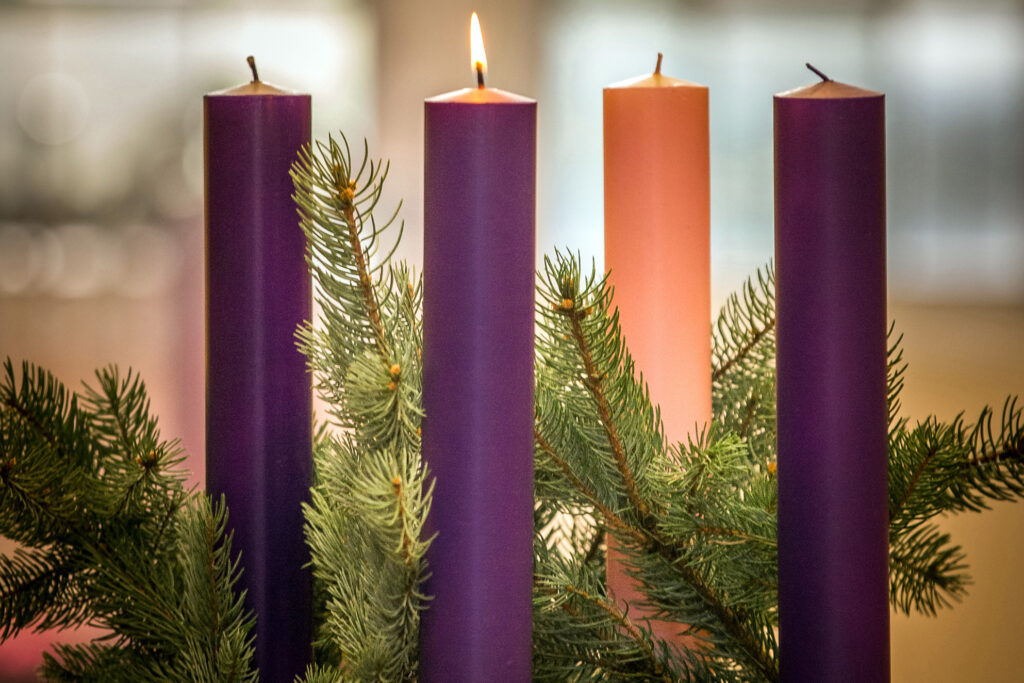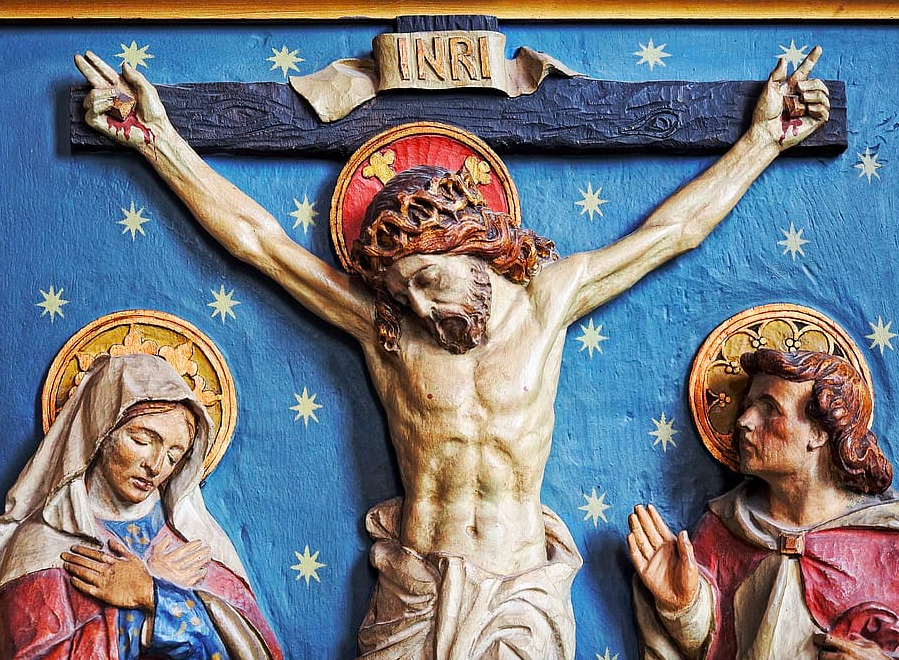
Almighty God, give us grace to cast away the works of darkness, and put on the armor of light, now in the time of this mortal life in which your Son Jesus Christ came to visit us in great humility; that in the last day, when he shall come again in his glorious majesty to judge both the living and the dead, we may rise to the life immortal; through him who lives and reigns with you and the Holy Spirit, one God, now and for ever. Amen. (BCP, 2019)
Greetings in the name of our Lord Jesus Christ on this, the start of the first week of Advent. May the grace of our Lord Jesus Christ, and the love of God, and the fellowship of the Holy Spirit be with you all. This week is the first week of the season of Advent. For Christians, this is our liturgical new year. This season is a season of hopeful anticipation of the advent, the coming of our Lord. It is an opportunity to consider the impact of His first coming some two-thousand years ago. How the birth of God in human flesh changed the course of humanity. Isaiah describes a people lost to sin and alienated from God. That was their unescapable reality, but the birth of Christ changed everything, it changed that reality. It is a chance for each of us to consider how the coming of Christ has changed each of our lives as well.
Likewise, Advent is a time to prepare for His second coming in great glory to bring justice and righteous judgment to both the living and the dead. Many are confused by this season. Is it a season of celebration or of penitence? Is it a time of feasting or a time of fasting? Is it just a preliminary celebration of Christmas, or is it more like lent? Advent is unique, it is a time of preparation—and with that, most of us are familiar. But what are we accustomed to preparing for?
We are all familiar with preparing for our winter vacations, road-trips, and much needed family time. We are also all familiar with preparing elaborate and exciting holiday parties with special foods, drinks, and treats. We are all too familiar with preparing for Christmas celebrations by adorning our homes, our cars, and our sweaters with lights and tinsel and reindeer antlers. But how familiar are we with preparing our hearts?
Often, the meaning of Advent is lost in the premature celebration of Christmas. Much like the idea of celebrating a wedding reception before the wedding, all of our festivities and parties are often out of place during this season of Advent. Our culture has jettisoned the more somber spirit of Advent, where we are called to become focused and intentional, to ready ourselves for the celebration of Christmastide.
A feast is always much better when it is preceded by a good fast. Christmas is not just about a single morning gathered around a family Christmas tree, it is a twelve-day feast, a season of feasting and celebration. When we over-indulge and celebrate prematurely, we lose the significance of what we are celebrating, and it becomes all about the celebration, not the cause for it.
In our culture, there is an unfortunate trend of outsourcing preparation, of just having it delivered, all ready to go. We skip the challenging, tedious stuff, and go straight for the enjoyment. We are too busy to prepare and too distracted to enjoy the preparation. If we allow ourselves to start our celebrations too early, we may find ourselves tired of Christmas before it ever arrives and, more importantly, we will have missed the opportunity to ready ourselves.
I invite you this year to rediscover the joy of the season of advent. To become as intentional about how you prepare your hearts as you are about how you prepare your homes. To take advantage of the opportunity for a good fast, a break from the materialism and indulgences of this world and to enter into a time of self-examination and preparation in hopeful anticipation of the return of our Lord.
In our collect for this first week of Advent we prayed that God would give us grace to cast away the works of darkness and put on the armor of light so that we might be prepared for his second advent. Let us consider with soberness this week what that actually means. In our Gospel lesson for the first Sunday in Advent, Our Lord tells us to keep watch, to stay awake, to be prepared for His return. “And what I say to you I say to all: Stay awake.” He says it three times in this short lesson. Stay awake. Are we awake? As a culture as a church? Are we awake?
This is our opportunity to wake up. This is our chance to realize that, just like the Prophet Isaiah describes, “We have all become like one who is unclean, and all our righteous deeds are like a polluted garment.” We do not know the day or the hour of our Lord’s return, but we are called to live as though it is imminent. To take notice of the signs of the season, the signs of our time, and to not be caught unaware. To be ready, on guard, awake and waiting in hopeful anticipation.
What does it mean to cast away the works of darkness in our lives? I assure you, they are there. The works of darkness are there in each of our lives, whether it be active and intentional sin, or a negligence of our Godly responsibility to live our lives consecrated to Him. As we enter together this season of Advent, a time to commit ourselves more fully to Him, to consider His warning, His challenge to us to remain awake, take advantage of this time and do not miss the this opportunity to consider what works of darkness you need to cast away.
This is a season of honest examination, a much-needed chance to take a good, long, hard look at ourselves and consider where we need to repent, to re-orient ourselves to Christ. To root out our selfishness, to renounce the materialism of this culture, to recognize and name our flaws and to seek the grace and help of God the Holy Spirit that we might be restored and brought to greater conformity with Christ our Lord. It is a gracious opportunity given to us by our Lord to ensure that we are not caught unaware, asleep at His return, an opportunity to make ourselves ready. Are you ready? Are you awake?
This same lesson from Saint Mark’s Gospel opens with a prophesy from our Lord that “in those days, after that tribulation, the sun will be darkened, and the moon will not give its light, and the stars will be falling from heaven, and the powers in the heavens will be shaken. And then they will see the Son of Man coming in clouds with great power and glory.” What are we to make of this, how are we called to respond?
Saint Ambrose, in the fourth century, thought this was a reference to the Church, the moon and stars the Lord describes here. He said, like the moon reflects the light of the Sun, which is diminished when the earth comes in between the moon and sun, so too is the church called to reflect the glory of Christ, the Son, and when we allow the things of this world to come between us, we too will be diminished and no longer shine with the radiance of Christ’s glory. I, no more than Saint Ambrose, know whether this is what the Lord meant by his prophesy or if it is a literal darkening of the moon and stars, but the worlds of Saint Ambrose are no less true either way.
When the church allows the cares and occupations of this world to get in between us and Christ, we indeed are diminished. Our witness is diminished. We must cast off the works of darkness and we must put on the armor of light. That is what this season of Advent is all about. Full commitment of ourselves to our Lord, diligent and awake, awaiting His return.
During this season, we tend to see evergreens used as decorations in church and homes all around us. Evergreens were originally chosen as a way to express devotion during this season because they represent constancy, stability, and endurance. Whereas the beautiful flowers of spring bloom brightly but quickly fade away, evergreens remain all year round. They represent things eternal.
This season is an opportunity for us to realign our focus from those things which distract us, things which are temporary in nature, and refocus on things eternal, the things that really matter, that have eternal consequence. So that we might be found awake and ready at our Master’s return. This is our opportunity to ready ourselves. May we not waste this chance as it may very well be our last.
Almighty and gracious Lord, You have called us to this time of hopeful anticipation, to make ourselves awake and ready. Give us the grace to examine ourselves and truly to cast off the works of darkness in our lives that we might be found ready. To put the armor of light, that we might withstand the distractions and temptations of this world and truly reflect your radiance. We pray this through Your most holy name, Lord Christ, who lives and reigns with the Father and the Holy Spirit, one God now and evermore. Amen.
Blessings,
Kenneth++Abbot, OSC


